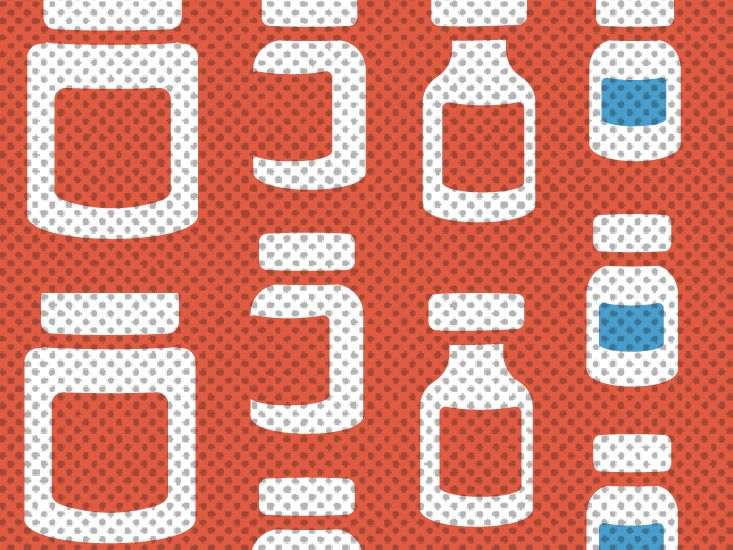Understanding the Link Between ADHD and Gluten
Attention deficit hyperactivity disorder (ADHD) is a common neurodevelopmental disorder characterized by inattentiveness, hyperactivity and impulsivity. It affects around 5% of children and adolescents globally. The exact causes of ADHD are not fully understood, but research suggests that genetics, environment and brain chemistry play a role.
In recent years, there has been growing interest around the potential role of nutrition in ADHD. Some studies have indicated that certain dietary factors may worsen or improve ADHD symptoms in some children. One of the most heavily researched dietary interventions is a gluten free diet.
What is Gluten?
Gluten is a type of protein found naturally in grains like wheat, barley and rye. It acts as a glue that holds food together and gives it a chewy texture. For most people, consuming gluten is not a problem.
However, for those with celiac disease or gluten sensitivity, gluten can trigger an abnormal immune response that causes inflammation and damage to the small intestine. This can lead to symptoms like abdominal pain, bloating, diarrhea and nutrient malabsorption.
The Gluten-ADHD Hypothesis
There are a few reasons why gluten has been investigated in relation to ADHD:
- Some studies have found a higher prevalence of celiac disease antibodies in children with ADHD compared to the general population.
- ADHD symptoms are sometimes seen in children with celiac disease.
- There is overlap between ADHD symptoms and symptoms of gluten sensitivity, such as brain fog.
- Removing gluten from the diet has reduced ADHD symptoms in some children.
Based on these observations, the theory is that gluten may trigger immune and inflammatory reactions in the body that affect brain function and worsen ADHD symptoms in some children. However, there is no definitive proof that gluten causes or exacerbates ADHD.
Does a Gluten Free Diet Help ADHD?
Overall, the research on gluten free diets for ADHD has been mixed:
- Some small studies have shown that removing gluten from the diet improved attention, hyperactivity and oppositional behavior in children with ADHD.
- Larger scale studies have found little to no benefit from a gluten free diet for most children with ADHD.
- One study found that the subset of children with ADHD who had celiac disease antibodies showed significant improvement on a gluten free diet.
Based on the available evidence, there is likely a subset of children with ADHD who may benefit from a gluten free diet. However, the majority of children with ADHD do not appear to have adverse reactions to gluten.
Foods to Limit or Avoid on a Gluten Free Diet for ADHD
For children who may be sensitive to gluten, here are some of the main foods containing gluten that should be limited or avoided:
1. Wheat
Wheat and products made from wheat flour contain gluten and should be avoided on a strict gluten free diet. This includes bread, pasta, crackers, baked goods, cereals, etc.
There are many gluten free substitutes available, like breads and pastas made from rice flour, quinoa flour or almond flour.
2. Barley
Barley is a grain that contains gluten. Barley is often used to make soups, stews and health drinks. Barley malt is also a common additive in many processed foods.
3. Rye
Rye is another gluten-containing grain. It is found in breads, cereals and other products, sometimes labeled as rye flour.
4. Oats
Oats do not naturally contain gluten, but they are often cross-contaminated with wheat or barley during growing and processing. Some individuals with celiac disease or gluten sensitivity may not tolerate oats.
There are some oat products verified as gluten free, made from oats grown and processed separately from other grains.
5. Beer
Most beer is produced using barley malt, making it off-limits on a gluten free diet. There are some gluten removed and gluten free beers made from ingredients like sorghum, rice or corn.
6. Sauces, Soups and Gravies
Many pre-made sauces, soups, gravies and dressings contain wheat flour or barley as thickeners. Check labels and call manufacturers to verify gluten free status.
7. Processed Meat Products
Some processed meats like sausages, hot dogs and deli meats contain fillers and flavors made with barley or wheat. Opt for gluten free brands or meats without fillers.
8. Soy Sauce
Most soy sauce is brewed using wheat, making it unsuitable for a gluten free diet. Check for gluten free tamari or coconut aminos as an alternative.
9. Salad Dressings and Marinades
Many commercial salad dressings and marinades contain ingredients like wheat flour, malt vinegar or barley malt. Make your own dressings at home or read labels carefully.
Foods to Eat on a Gluten Free Diet for ADHD
While limiting high gluten foods, its important to focus on incorporating nutritious gluten free foods:
1. Fruits and Vegetables
All fresh fruits and vegetables are naturally gluten free. Aim for variety and abundance from this food group, including berries, citrus fruits, dark leafy greens, winter squash, broccoli, tomatoes and more.
2. Lean Proteins
Beef, poultry, fish, eggs, beans and lentils are nutritious gluten free protein options. Try incorporating wild-caught salmon, grass-fed beef, organic chicken and eggs from pastured hens.
3. Nuts and Seeds
Nuts like almonds, walnuts and pistachios are gluten free nutrient powerhouses. Chia seeds, flaxseeds, hemp seeds and sunflower seeds are great options too.
4. Dairy Alternatives
Choose gluten free dairy options including milk, yogurt and cheese made from nut milks, coconut milk, rice milk or hemp milk.
5. Gluten Free Whole Grains
Quinoa, brown rice, buckwheat, amaranth, sorghum and teff provide important nutrients minus the gluten. Oats certified gluten free can be included too.
6. Healthy Fats
Consume healthy fats like avocado, olive oil, ghee, coconut oil and coconut butter to support brain health and satisfy the appetite.
Other Tips for Managing ADHD with a Gluten Free Diet
Work with a Healthcare Provider
Partner with your childs doctor, dietitian or health coach to determine if a gluten free trial may be worthwhile. Get customized guidance on implementing a gluten free diet safely and meeting nutritional needs.
Evaluate and Rechallenge
If trying a gluten free diet, eliminate gluten completely for at least 3-4 weeks to notice any effects. Then consider methodically reintroducing gluten to see if symptoms return.
Focus on Whole Foods
Emphasize unprocessed, nutrient-dense gluten free whole foods like fruits, vegetables, lean proteins, dairy alternatives and ancient grains. Limit junk food even if gluten free.
Supplement Carefully
A gluten free diet may lead to deficiencies in iron, calcium, fiber, folate, niacin and B vitamins if food variety is limited. Have nutrient levels checked and supplement if needed.
Look for Hidden Sources
Check labels carefully for gluten sources even in unconventional products like roasted nuts, lip balm, processed spices and flavored dental products.
The Bottom Line
There is some evidence that gluten may worsen symptoms for a subset of children with ADHD. However, a gluten free diet is unlikely to benefit all cases. Parents can partner with healthcare professionals to determine if a gluten free trial could improve ADHD management. Focus on providing gluten free whole foods to support overall health.
For children who are sensitive, strictly avoiding sources of gluten while eating a balanced gluten free diet rich in fruits, vegetables, lean proteins, dairy alternatives and gluten free grains may help reduce ADHD symptoms. But work with a doctor to ensure nutrition needs are met.
FAQs
What is gluten?
Gluten is a type of protein found in grains like wheat, barley and rye. It helps foods maintain their shape and texture.
Why would gluten affect ADHD?
Some research suggests gluten could trigger inflammation that leads to worse ADHD symptoms in some children. But there is no definitive proof of this.
What foods contain gluten?
Grains like wheat, barley and rye contain gluten. It is also found in many processed foods like breads, cereals, sauces and beer.
Do all children with ADHD need a gluten free diet?
No, research suggests a gluten free diet only helps a small subset of children with ADHD who have sensitivities to gluten.
What are good gluten free food choices?
Focus on whole foods like fruits, vegetables, lean proteins, dairy alternatives and naturally gluten free grains like rice and quinoa.
Disclaimer: This article is for informational purposes only and does not constitute medical advice. Always consult with a healthcare professional before starting any new treatment regimen.
Related Coverage
Discover the potential link between chewing on objects and ADHD in children. Learn about oral fixation, the connection to sensory needs, and how to address this behavior with professional help and appropriate sensory outlets....
Learn how long Adderall stays effective for ADHD symptoms with immediate and extended release forms. Get tips for timing doses and minimizing ongoing side effects....
Auditory processing disorder affects listening, school work, and daily life; learn diagnosis methods and support strategies....
ADHD paralysis and depression can feel similar but are different. Learn how to tell ADHD paralysis vs depression apart and find effective support....
Explore the potential benefits of pre workout supplements for ADHD. Learn about the science behind ingredients like caffeine, L-theanine, and B-vitamins, and how to choose the right products....
If you have ADHD, mornings can be exceptionally hard. Learn strategies like optimizing sleep habits, prepping ahead, using accountability partners, and experimenting with alarms....
Shortages of ADHD medication Ritalin and its generic forms are impacting access in 2023. Learn more about why this is happening, possible alternatives, and ways to mitigate the issue....
ADHD requires an ongoing commitment to integrated treatments, self-care practices, community support, and advocacy to manage symptoms and thrive....
Learn how Quillivant XR dosage works, its liquid strengths, titration tips, safety precautions, and step‑by‑step dosing guidance....
Access real, professional online ADHD treatment from home. Find diagnosis, therapy, and medication options that fit your life....









